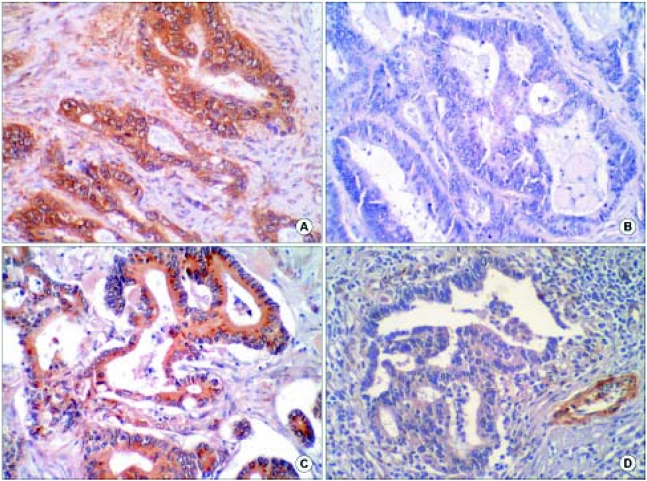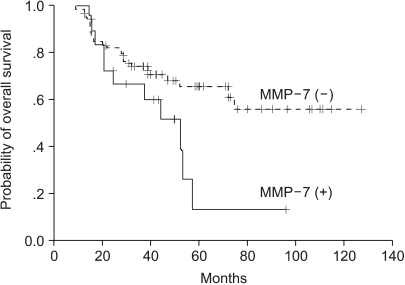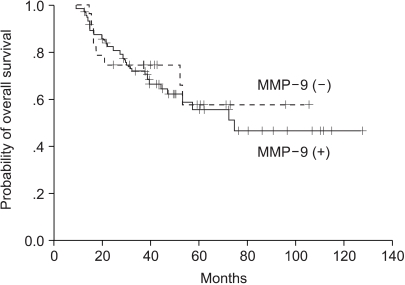Cancer Res Treat.
2005 Dec;37(6):354-359.
Expressions of Matrix Metalloproteinase-7 and -9 and their Prognostic Significances in Rectal Cancer
- Affiliations
-
- 1Department of Internal Medicine, Dong-A University College of Medicine, Busan, Korea. jskim3@dau.ac.kr
- 2Department of Surgery, Dong-A University College of Medicine, Busan, Korea.
- 3Department of Radiation Oncology, Dong-A University College of Medicine, Busan, Korea.
- 4Department of Pathology, Dong-A University College of Medicine, Busan, Korea.
- 5Department of Pharmacology, Dong-A University College of Medicine, Busan, Korea.
- 6Medical Research Center for Cancer Molecular Therapy, Dong-A University College of Medicine, Busan, Korea.
Abstract
- PURPOSE
The matrix metalloproteinases (MMPs) are a family of proteolytic enzymes. MMPs are known to be involved in tumor invasion, and several have been implicated in tumor prognosis. The aim of this study was to evaluate the prognostic significances of the expressions of MMP-7 and -9 in rectal cancer. MATERIALS AND METHODS: The tumor tissues of 87 patients with stage II or III rectal carcinoma that underwent potentially curative resection followed by postoperative adjuvant chemoradiation and 5-fluorouracil based chemotherapy, were investigated immunohistochemically using monoclonal antibodies against MMP-7 and MMP-9. Clinical information, including tumor grades, carcinoembryonic antigen (CEA) levels, and disease-free survival and overall survival were evaluated with respect to the expressions of MMP-7 and -9. RESULTS: Median follow-up duration was 53.2 months, and median patient age was 55+/-11 years (range 32~75). MMP-7 expression in tumor tissue was found to be significantly correlated with the presence of nodal metastasis (p=0.029), whilst MMP-9 expression correlated with depth of tumor invasion (p=0.019). No relatio- nships were found between the expressions of MMP-7 or -9 and age, sex, tumor size, tumor grade, or CEA level. Univariate analysis showed that MMP-7 expression was associated with poor 5-year overall survival (12.8 months vs. 65.3 months, p=0.0405). Multivariate analysis confirmed that MMP-7 was independently associated with an adverse outcome (Relative risk: 1.415, p=0.027). However, MMP-9 expression was not found to be related to clinical outcome. CONCLUSION: MMP-7 expression in tumor tissue is associated with lymph node metastasis and a poor 5-year overall survival in rectal cancer patients.
MeSH Terms
-
Antibodies, Monoclonal
Carcinoembryonic Antigen
Disease-Free Survival
Drug Therapy
Fluorouracil
Follow-Up Studies
Humans
Immunohistochemistry
Lymph Nodes
Matrix Metalloproteinase 7*
Matrix Metalloproteinases
Multivariate Analysis
Neoplasm Metastasis
Peptide Hydrolases
Prognosis
Rectal Neoplasms*
Antibodies, Monoclonal
Carcinoembryonic Antigen
Fluorouracil
Matrix Metalloproteinase 7
Matrix Metalloproteinases
Peptide Hydrolases
Figure
Reference
-
1. Shin HR, Won YJ, Jung KW, Park JG. 2001 Annual Report of the Korea Central Cancer Registry: based data from 134 hospitals. Cancer Res Treat. 2004; 36:19–30.2. Krook JE, Moertel CG, Gunderson LL, Wieand HS, Collins RT, Beart RW, et al. Effective surgical adjuvant therapy for high-risk rectal carcinoma. N Engl J Med. 1991; 324:709–715. PMID: 1997835.
Article3. Colorectal Cancer Collaborative Group. Adjuvant radiotherapy for rectal cancer: a systematic overview of 8,507 patients from 22 randomised trials. Lancet. 2001; 358:1291–1304. PMID: 11684209.4. O'Connell MJ, Martenson JA, Wieand HS, Krook JE, Macdonald JS, Haller DG, et al. Improving adjuvant therapy for rectal cancer by combining protracted-infusion 5-FU with radiation therapy after curative surgery. N Engl J Med. 1994; 331:502–507. PMID: 8041415.5. Seong J, Chung EJ, Kim H, Kim GE, Kim NK, Sohn SK, et al. Assessment of biomarkers in paired primary and recurrent colorectal adenocarcinomas. Int J Radiat Oncol Biol Phys. 1999; 45:1167–1173. PMID: 10613309.
Article6. Garrity MM, Burgart LJ, Mahoney MR, Windschitl HE, Salim M, Wiesenfeld M, et al. Prognostic value of proliferation, apoptosis, defective DNA mismatch repair, and p53 overexpression in patients with resected Dukes' B2 or C colon cancer: a North Central Cancer Treatment Group Study. J Clin Oncol. 2004; 22:1572–1582. PMID: 15117979.7. Crawford HC, Matrisian LM. Tumor and stromal expression of matrix metalloproteinases and their role in tumor progression. Invasion Metastasis. 1995; 14:234–245. PMID: 7657516.8. McCawley LJ, Matrisian LM. Matrix metalloproteinases: multifunctional contributors to tumor progression. Mol Med Today. 2000; 6:149–156. PMID: 10740253.
Article9. Miyazaki K, Hattori Y, Umenishi F, Yasumitsu H, Umeda M. Purification and characterization of extracellular matrix-degrading metalloproteinase, matrin (pump-1), secreted from human rectal carcinoma cell line. Cancer Res. 1990; 50:7758–7764. PMID: 2253219.10. Adachi Y, Yamamoto H, Itoh F, Hinoda Y, Okada Y, Imai K. Contribution of matrilysin (MMP-7) to the metastatic pathway of human colorectal cancers. Gut. 1999; 45:252–258. PMID: 10403738.
Article11. Zucker S, Vacirca J. Role of matrix metalloproteinases (MMPs) in colorectal cancer. Cancer Metastasis Rev. 2004; 23:101–117. PMID: 15000152.
Article12. Liotta LA, Stetler-Stevenson WG. Metalloproteinases and cancer invasion. Semin Cancer Biol. 1990; 1:99–106. PMID: 2103492.13. Zeng ZS, Huang Y, Cohen AM, Guillem JG. Prediction of colorectal cancer relapse and survival via tissue RNA levels of matrix metalloproteinase-9. J Clin Oncol. 1996; 14:3133–3140. PMID: 8955659.
Article14. Roeb E, Dietrich CG, Winograd R, Arndt M, Breuer B, Fass J, et al. Activity and cellular origin of gelatinases in patients with colon and rectal carcinoma differential activity of matrix metalloproteinase-9. Cancer. 2001; 92:2680–2691. PMID: 11745204.15. Wagenaar-Miller RA, Gorden L, Matrisian LM. Matrix metalloproteinases in colorectal cancer: is it worth talking about? Cancer Metastasis Rev. 2004; 23:119–135. PMID: 15000153.
Article16. Mori M, Barnard GF, Mimori K, Ueo H, Akiyoshi T, Sugimachi K. Overexpression of matrix metalloproteinase-7 mRNA in human colon carcinomas. Cancer. 1995; 75(Suppl 6):1516–1519. PMID: 7889484.
Article17. Adachi Y, Yamamoto H, Itoh F, Arimura Y, Nishi M, Endo T, et al. Clinicopathologic and prognostic significance of matrilysin expression at the invasive front in human colorectal cancers. Int J Cancer. 2001; 95:290–294. PMID: 11494227.
Article18. Mook OR, Frederiks WM, Van Noorden CJ. The role of gelatinases in colorectal cancer progression and metastasis. Biochim Biophys Acta. 2004; 1705:69–89. PMID: 15588763.
Article19. Collins HM, Morris TM, Watson SA. Spectrum of matrix metalloproteinase expression in primary and metastatic colon cancer: relationship to the tissue inhibitors of metalloproteinases and membrane type-1-matrix metalloproteinase. Br J Cancer. 2001; 84:1664–1670. PMID: 11401321.
Article20. Masuda H, Aoki H. Host expression of matrix metalloproteinase-2 and tissue inhibitor of metalloproteinase-2 in normal colon tissue affects metastatic potential of colorectal cancer. Dis Colon Rectum. 1999; 42:393–397. PMID: 10223763.
Article21. Coussens LM, Fingleton B, Matrisian LM. Matrix metalloproteinase inhibitors and cancer: trials and tribulations. Science. 2002; 295:2387–2392. PMID: 11923519.
- Full Text Links
- Actions
-
Cited
- CITED
-
- Close
- Share
- Similar articles
-
- Expression of matrix metalloproteinase-2 and survivin in endometrioid and nonendometrioid endometrial cancers and clinicopathologic significance
- Expressions of MMP-2, MMP-9, TIMP-1, and TIMP-2 as prognostic factors in endometrial cancer
- The Expression and Clinical Correlations of Matrix Metalloproteinase-2, -7, -9, and -12 in Colorectal Cancer
- MMP-2 and MMP-9 Expressions in Breast Carcinomas and Relationship with Major Prognostic Factors
- Matrix Metalloproteinase-2 and -7 Expression in Colorectal Cancer




